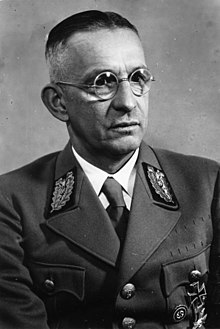Alfred Meyer
| Alfred Meyer | |
|---|---|

Meyer in 1941
|
|
| Wannsee Conference representative for the Reich Ministry for the Occupied Eastern Territories | |
|
In office 20 January – 6 March 1942 (two meetings) |
|
| Oberpräsident of the Province of Westphalia | |
|
In office 1938 – May 1945 |
|
| Preceded by | Ferdinand Freiherr von Lüninck |
| Succeeded by | Rudolf Amelunxen |
| Minister-President of the Free State of Lippe | |
|
In office 1933–1945 |
|
| Preceded by | Hans-Joachim Riecke |
| Succeeded by | Heinrich Hermann Drake |
| Reichsstatthalter of the Free State of Lippe | |
|
In office 1933–1945 |
|
| Preceded by | None |
| Succeeded by | None |
| Reichsstatthalter of the Free State of Schaumburg-Lippe | |
|
In office 1933–1945 |
|
| Preceded by | None |
| Succeeded by | None |
| Gauleiter of the Gau of North Westphalia | |
|
In office 1931–1945 |
|
| Preceded by | None |
| Succeeded by | None |
| Personal details | |
| Born | 5 October 1891 Göttingen |
| Died | 11 April 1945 (aged 53) Hessisch Oldendorf |
Gustav Alfred Julius Meyer (5 October 1891 in Göttingen – 11 April 1945 in Hessisch Oldendorf) was a Nazi official. He joined the Nazi party in 1928 and was from 1930 to 1945 the Gauleiter of North Westphalia and from 1933 to 1945 the Reichsstatthalter in Lippe and Schaumburg-Lippe
By the time of his death at the end of World War II in Europe, he was a State Secretary and Deputy Reichsminister in the Reich Ministry for the Occupied Eastern Territories (Reichministerium für die Besetzten Ostgebiete or Ostministerium). He represented the ministry with Georg Leibbrandt in the Wannsee Conference.
Meyer committed suicide in April 1945.
Meyer was born in Göttingen, the son of a Prussian civil servant who was stationed in Göttingen due to his official duties. The middle class family was originally from Essen. He was educated at the Gymnasium in Soest, graduating in 1911.
In 1912 he became a Fahnenjunker (cadet officer) with Infanterieregiment 68 (Koblenz), passing his officer exam in 1913 and being promoted to lieutenant. During World War I he fought with Infanterieregiment 363 on the Western Front, earning the Iron Cross First and Second Class and the Wound Badge. In 1917 he was injured and captured by the French. This experience, according to Meyer, was especially traumatic and left him with a hatred against France. Released from captivity in March 1920, the downsized Reichswehr had no use for him and he left the army with the rank of Hauptmann (Captain).
...
Wikipedia
